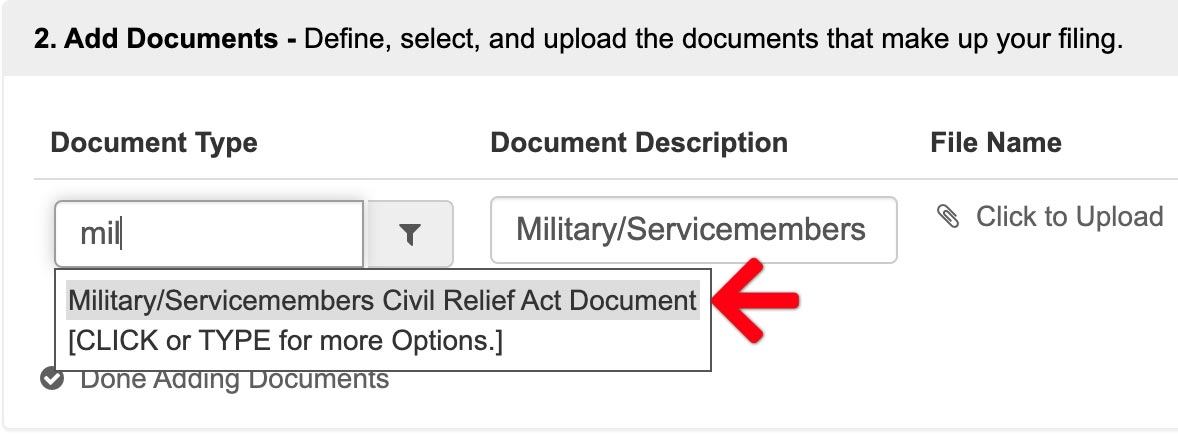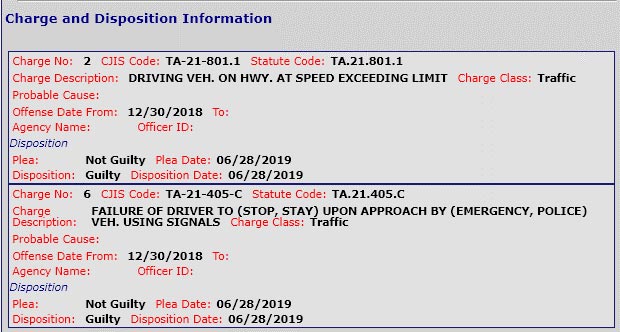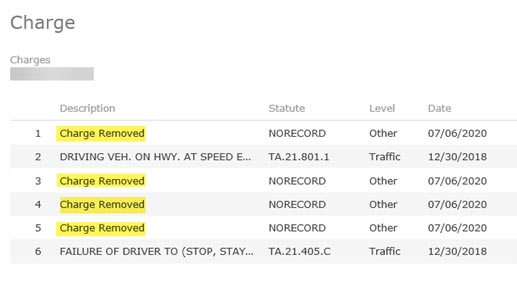In Maryland’s District Courts, filers may choose the document type of Military/Servicemembers Civil Relief Act Document for the reporting of non‑military service. Please use this filing code when filing non-military affidavits.
For additional information on the Servicemembers Civil Relief Act compliance, see https://mdcourts.gov/district/selfhelp/scra
E-Serving State’s Attorneys
It is important to remember to serve the state’s attorneys and other parties required by rule. The State’s Attorney’s Offices have generic email addresses set up to receive e-service. Please refer to the email addresses listed here when attempting to e-serve the State’s Attorney’s Offices in MDEC counties:
State’s Attorneys E-mail Addresses
Select “Serve” when the Rules provide for a document to be served but not filed into the court. Select “EfileAndServe” when the Rules provide for a document to be both filed and served. For additional information on electronic service, see the MDEC Policies and Procedures manual (page 36) or this reference https://mdcourts.gov/sites/default/files/import/mdec/pdfs/mdecelectronicservice.pdf.
E-filing into the Court of Special Appeals – Subsequent filings only
The Court of Special Appeals is not a court of original jurisdiction, therefore, notices of appeal must be filed in the circuit court which issued the judgment being appealed. Pursuant to Rule 16-406, upon the filing of a notice of appeal, the Clerk of the Circuit Court transmits a copy of the notice to the Clerk of the Court of Special Appeals via email. The Clerk of the Court of Special Appeals then opens an appeal record and notifies counsel and registered users via e-service of the appellate case number into which counsel can e-file documents, e.g., the civil appeal information report and any preliminary motions. E-filing into the Court of Special Appeals is only available for subsequent filings. If you must file something in the Court of Special Appeals prior to receipt of notice, contact the Clerk at 410-260-1450 for instructions.
Notice regarding multiple related citations
You may submit a pleading, motion, entry of appearance, or other filing that contains all the related citation numbers, as long as you file the submission into each citation.
You may submit an entry of appearance that contains all the related citation numbers, as long as you file the entry of appearance into each citation.
Unit charge removals
Maryland Code, Criminal Procedure, Article, §10-107 defines two or more criminal or incarcerable traffic charges arising from the same incident, transaction, or set of facts as a “unit.” Any charges for minor traffic violations that arise from the same incident, transaction, or set of facts are not part of the “unit.”
If a defendant’s case consists of unit charges and non-unit charges, and each unit charge is eligible for expungement, the court could order that one or all of the unit charges be expunged. If so ordered, the court must remove all relevant court records from public inspection, thereby charges may appear to be missing from the sequential list of charges assessed to a case (e.g., after removal of the unit charges 1, 3, 4 and 5, the charges display as 2 and 6 on Case Search. Charges missing from cases on Case Search are deliberate and reflect the court’s unit charge removal.
Unit Charge Removals, however, will appear differently in the Maryland Judiciary Record Search Portal as a Charge Removed.
References: Statute CP §10-107 and Court of Special Appeals Case No. CSA-REG-2182-2018
New legislation mandating case protection
As a result of House Bill 83 and Senate Bill 314: 2020 Regular Session, certain criminal cases will be protected from public view beginning March 15, 2021. HB 83 prohibits the display of any District Court criminal case where marijuana is the only charge and the charge was disposed before October 1, 2014. SB 314 specifies that a case where a juvenile is charged as an adult will remain confidential until the court determines whether the case will be transferred to juvenile court.


